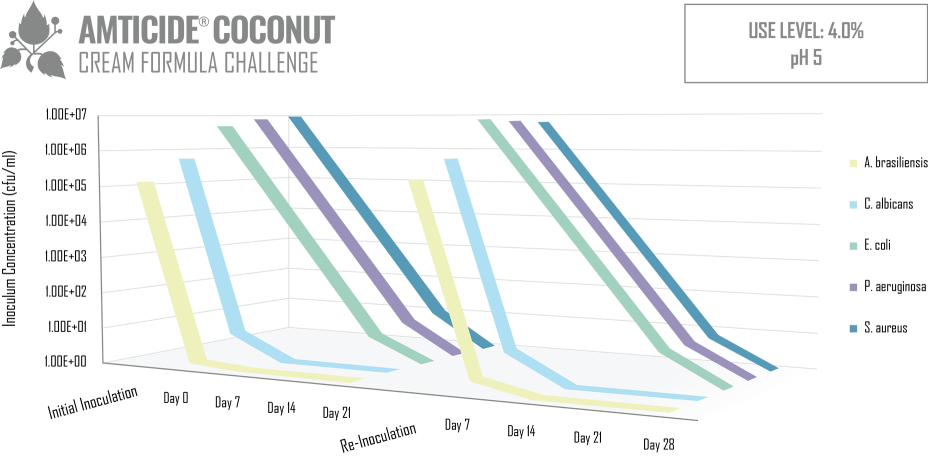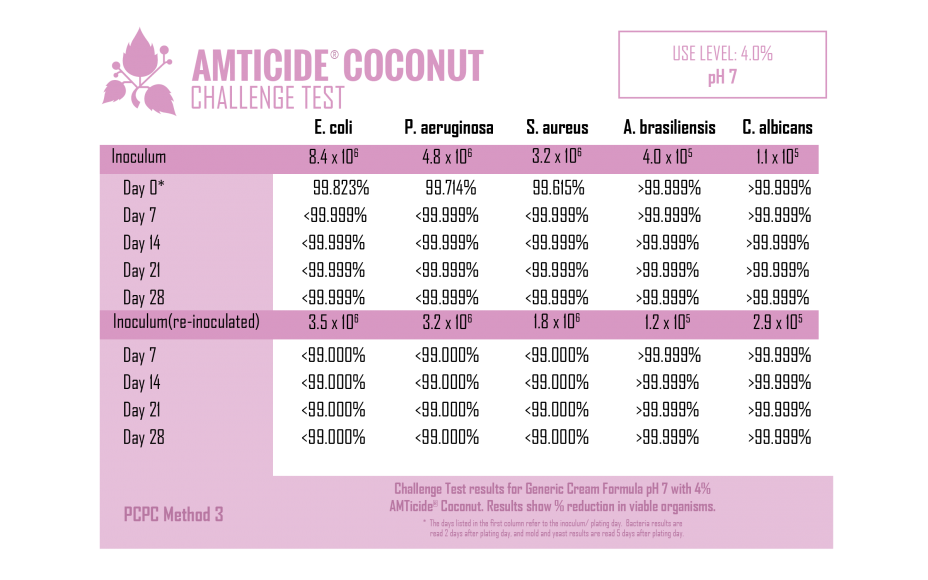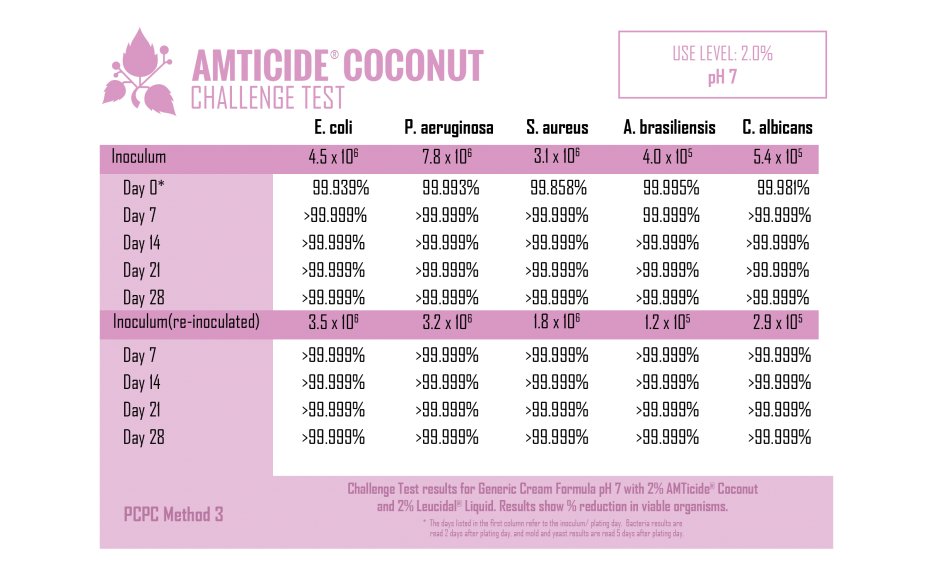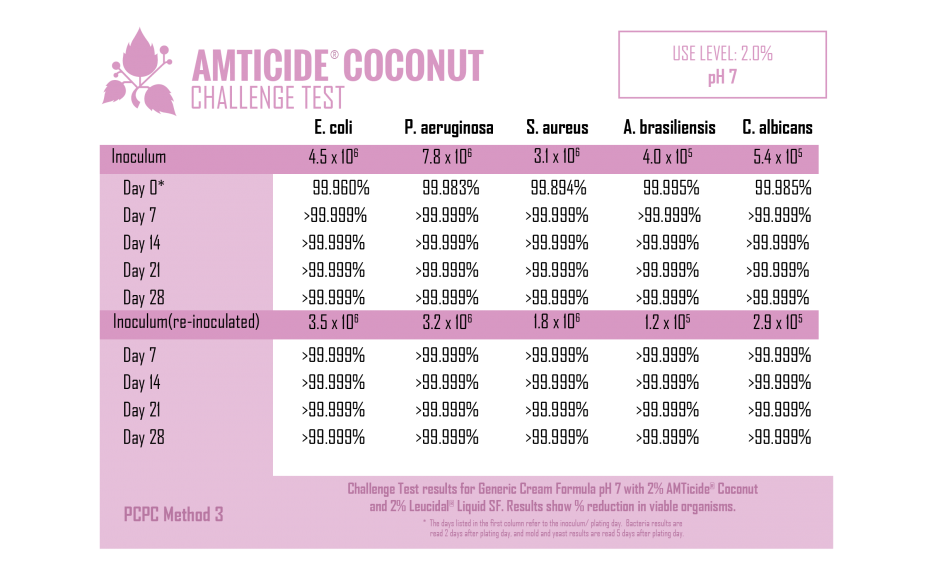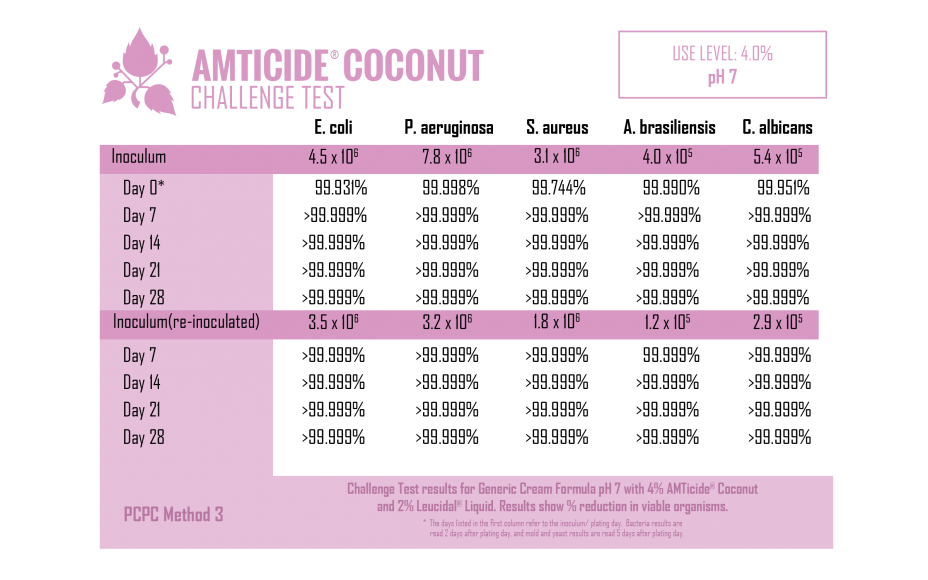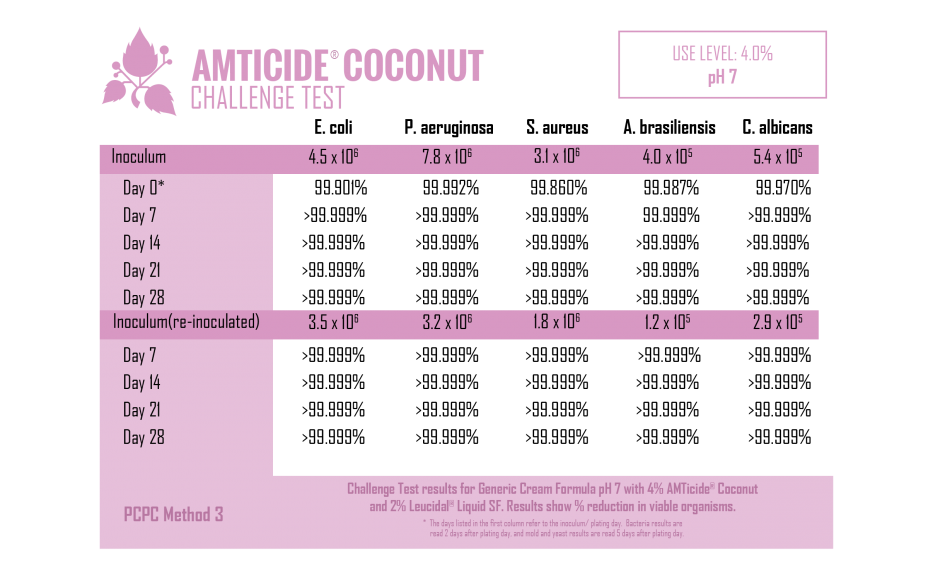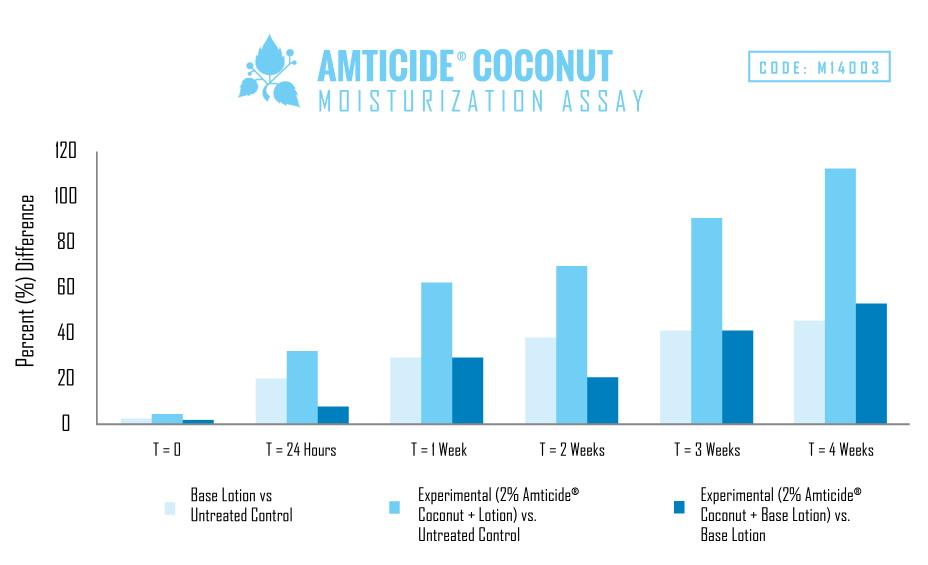AMTicide® Coconut
Background
Fueled by the ever-changing regulations and the increasing safety concerns, among consumers, we must steer away from synthetics and focus on natural solutions. AMTicide® Coconut is developed by fermenting Cocos nucifera (Coconut) fruit with Lactobacillus to deliver a non-irritating, effective and multifunctional product. This highly marketable product can provide moisturizing and conditioning benefits in hair and skin care applications. In addition, it is effective at preventing the growth of fungus, specifically yeast and mold, thus providing the perfect addition to any formulation. As we know, the use of parabens and formaldehyde donor materials are coming to a screeching halt, as controversy continues to surround them. When companies began phasing out parabens and formaldehyde donor materials, they replaced them with ingredients that dissociate into formaldehyde when put in an aqueous solution, such as DMDM Hydantoin. This option is not only cost effective but also protected formulas against bacteria, yeast and mold, which made the life of formulators seemingly effortless. However, as consumers continue to focus on natural solutions, these products are no longer an acceptable option. This leads the quest for natural antimicrobial products that can suit the needs of formulators and ultimately consumers. The challenge is not only finding one product that will protect against a wide range of microorganisms but also finding another product to supplement it, for protection that will not fail. How do we achieve the protection we need in a formulation without adding any synthetic ingredients?
Science
Active Micro Technologies has prided itself in developing and supplying effective, natural products that provide skin and hair conditioning benefits, along with providing natural antimicrobial activity. As our original Leucidal Liquid product line continues to flourish, we still had the need for an antifungal product to round out our portfolio. This need left us with a long road of trial and error, in efforts to develop a marketable, yet effective antifungal booster. AMTicide® Coconut was developed to be used in conjunction with one of our broad-spectrum antimicrobials, however it can be used alongside any preservative package for extra protection against yeast and mold. We began investigating the antimicrobial effects of medium chain triglycerides (MCT’s), which have been studied for years. MCT’s, including lauric acid, have natural antifungal activity and work by disrupting the cellular structures of fungus, thus essentially destroying them before they can wreak havoc. This led us to an exotic oil that is rich in MCT’s – the well-known coconut oil. Coconut oil has been an important component of the Ayurveda tradition, popular among people of the tropics and currently at the center of a health craze in the U.S. First, it was coconut water for hydration, then coconut oil for health and now coconut is popping up in just about every industry. We cannot seem to get away from this fruit and for good reason. So what makes coconut oil so unique? As mentioned, coconut oil is rich in MCT’s, particularly lauric acid, which comprises ~50% of its total fatty acid content. Coconut oil was traditionally used to treat skin disorders, yeast infections, ringworm and even athletes foot. What many of these skin issues had in common was that they were all a type of yeast infection. Yeast and mold are types of fungus that can be inconspicuous because of their small size and structure and can flourish in our favorite skin care and cosmetic products. This can lead to not only destruction of that lotion you love, but it can also create a health hazard. Natural antimicrobial products are similar to synthetic preservatives systems, in that they are effective against bacteria, however not as effective against fungus, specifically yeast and mold. One of the first steps in the development of this product was to determine the products potential ability to inhibit the growth of yeast and mold. Using standard serial dilution protocols in growth media, the Minimum Inhibitory Concentrations (MICs) for AMTicide® Coconut were determined for both yeast and mold organisms.
The positive MIC screening results warranted further testing to confirm its ability to provide product preservation. A Double Challenge Test was completed using 2% AMTicide® Coconut by itself and AMTicide® Coconut with Leucial® Liquid in a generic cream base formulationat a pH of 7. Samples were inoculated with the microorganisms E. Coli, P. aeruginosa, S. aureus, A. brasiliensis and C. albicans.During the first 28-day incubation period, samples were periodically collected and tested for the presence of these fungi. Following this initial 28 days of incubation, the cream samples were then re-inoculated with the cultures and sampled over an additional 28-day period. Tables 2 and 3 shows the positive antifungal results for AMTicide® Coconut.
Benefits
Not only is coconut a fruit with powerful benefits but it also complies with our stringent sustainability standards. We have an array of coconut products, which leaves us with unused portions of this multifunctional fruit. As we continued the development process, we began utilizing the lipid fractions of the unused coconut pericarp, which allowed us to further optimize material usage and coincide with our sustainability commitment. In addition, we incorporated our specialty technique of LAB (lactic acid bacteria) fermentation. Fermentation is an important process that can increase the bioavailability of natural phytocompounds, which can uncover wide array of benefits. A next generation, natural antifungal product was born.
An in-vivo study was also conducted over the course of three weeks to evaluate AMTicide® Coconut’s ability to increase moisturization. Ten (M/F) subjects between the ages of 23 – 45 participated in the study. A DermaLab Corneometer was used to measure the moisture levels on the subject’s volar forearms. The Corneometer is an instrument that measures the amount of water within the skin. Baseline measurements were taken on day one of the study. Following initial measurements, all subjects were to apply 2 mg of the positive control and test material to the denoted area on their respective forearms, twice a day for three weeks. The test material consisted of 2.0% AMTicide® Coconut + Base Lotion and the positive control (base lotion) used was Cetaphil Moisturizing Lotion for All Skin Types. AMTicide® Coconut was developed to be coupled with one of our broad-spectrum antimicrobials, such as Leucidal® Liquid, or perhaps any preservative package that is lacking protection, against yeast and mold. This added boost of antifungal activity is the natural additive that will protect your product and consumers. Say goodbye to using potassium sorbate or sodium benzoate for added protection. Replace them with an eco-friendly, marketable and consumer acceptable antifungal product for the protection, and brand differentiation your product craves.
Use Recommendations
As with all biological materials, some attention must paid to the conditions under which AMTicide® Coconut is used. Based on bench-scale evaluations, as well as actual product applications, AMTicide® Coconut has been found to be effective over a wide range of typical cosmetic and personal care product manufacturing conditions. The product has been found to be heat stable up to 70°C and active under both acidic (pH 3) and basic conditions (pH 8).

